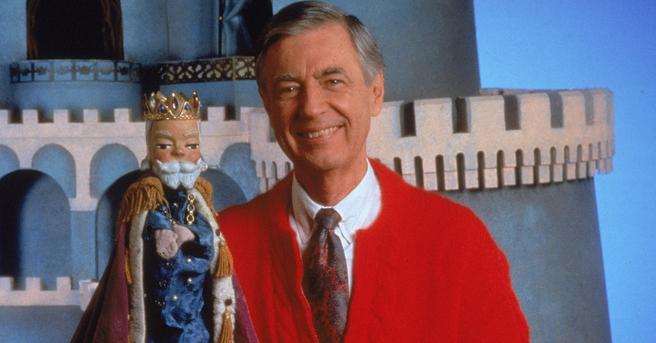
It seems hardly coincidental that two films on the life of children’s television host and ordained Presbyterian minister Fred Rogers were released in as many years. A Beautiful Day in the Neighborhood (2019), a feature starring Tom Hanks and directed by Marielle Heller, was nominated for the Top 100 but didn’t make the cut. Morgan Neville’s 2018 documentary, Won’t You Be My Neighbor?, obviously did.
It’s hardly coincidental, for Fred Rogers is a saint for our time. In an era where the majority of white American Protestants have saddled themselves to a Chief Executive who traffics in hate, fear, division, bullying, and lies, Rogers epitomized love, quiet courage, acceptance, humility, and integrity. In a period where the last three popes have fostered a safe haven for pedophile priests, Mr. Rogers’ care and compassion for children stand out for its purity.
To his credit, Morgan Neville doesn’t hit viewers over the head with Fred Rogers as the anti-Trump. But for those with eyes to see, it’s no happenstance that early in Won’t You Be My Neighbor?, we’re shown clips from the first week of Mister Rogers’ Neighborhood,during which blustery King Friday XIII’s efforts to build a wall around his castle are foiled by his peace-loving citizens.
Neville, who has been directing documentaries since 1995 and won an Oscar for 2013’s 20 Feet from Stardom, masterfully splices together period news footage, present-day interviews, simple animation, and clips from Mister Rogers’ Neighborhood to demonstrate how wisely Rogers responded to crises in real time. After national news of a hotel manager dumping chemicals in a pool to prevent black guests from swimming with white guests, Mister Rogers invited François Clemmons, one of the first African-American regulars on children’s TV, to dip his feet in a kiddie pool with him and share a towel afterwards. (Clemmons is also a gay man who describes Rogers’ migration away from homophobia, ultimately regarding him as a surrogate father.) In the frightful aftermath of 9/11, Rogers spoke of our calling to be tikkun olam, “repairers of creation.”
Yet, for all his timeliness, there is a timelessness to Fred Rogers’ virtues. Rogers saw the sacredness of each individual, stating “when I look at the camera, I think of one person,” describing the space between the TV screen and a child’s watching eyes as holy ground. Neville’s visual accompaniment to these words is brilliant, showing the faces of children of various ethnicities, filmed through glass.
Rogers also possessed a yogi’s discipline, swimming a mile daily and maintaining the same weight throughout his adult life. His weight – 143 pounds – even carried a sacred valence for him, as 1-4-3 signified “I love you.”
However, this rigor didn’t exclude joy, a sensation vividly conveyed by Neville’s film (I’ve cried joyous, grateful tears each time I’ve watched it). Rogers reveled in the pranks played on him by his production crew. Just as importantly, he brought a spirit of curiosity and wonder to his interactions on the show, whether singing with handicapped child (and later disability rights activist) Jeff Erlanger, or signing “I love you” to Koko the gorilla.
And like a good contemplative (and counter to the amped-up kid TV culture of the time), Rogers embraced slowness and silence. Marielle Heller’s feature powerfully embodies this: its most memorable scene involves Tom Hanks urging a journalist to take a minute to “think of all the people who loved us into being.” Heller then permits over a minute of screen silence (in a busy Chinese restaurant, no less), almost half of which Hanks is staring directly into the camera, to make sure we’re participating, too.
Neville ends his documentary with nearly the exact same exercise, asking his interview subjects to take a minute and silently remember somebody who helped them. Mr. Rogers’ wife Joanne, his sons John and Jim, his sister Elaine, and several others partake, their stillness encouraging our own reflection.
The exercise done, Joanne concludes Won’t You Be My Neighbor? with a “thank you.” In that same spirit of gratitude, thank you, Mr. Rogers, for your exemplary life. And thank you, Morgan Neville, for bringing his goodness back to life so vividly and attractively. — Andrew Spitznas, chief writer/editor at Secular Cinephile
- Directed by: Morgan Neville
- Produced by:
- Written by:
- Music by: Jonathan Kirkscey
- Cinematography by: Graham Willoughby
- Editing by: Jeff Malmberg Aaron Wickenden
- Release Date: 2018
- Running Time: 95 min
- Language: English
Arts & Faith Lists:
2018 Arts & Faith Ecumenical Jury — #3
2020 Top 100 — #52
2023 Top 25 Spiritually Significant Documentaries — #3